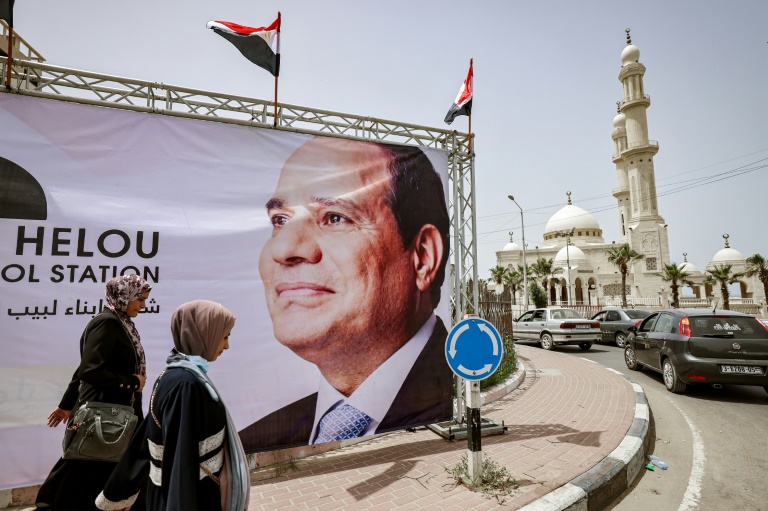Egypt is banking on a $500-million Gaza reconstruction project to shore up its influence in the Middle East, capitalising on clout it garnered by brokering a ceasefire between Israel and Hamas.
President Abdel Fattah al-Sisi pledged the cash injection to rebuild the Gaza Strip after it was left in ruins during an 11-day exchange of Hamas rocket fire and devastating Israeli air strikes.
Sisi was widely praised for playing a pivotal role in negotiating an end to the deadly hostilities between Israel and Gaza’s Islamist rulers Hamas on May 21, including by US President Joe Biden.
The aid package is in the form of construction undertaken by Egyptian firms — a playbook that Sisi has used to great effect domestically since taking power in 2014.
Sisi has employed the military’s engineering arm for large-scale infrastructure projects such as the construction of a new administrative capital, as well as dozens of flyovers and highways nationwide.
“Sisi no doubt sees this reconstruction aid as an investment in exchange for political influence — both on Egypt’s border in Gaza and at the international level,” Sarah Smierciak, a Middle East political economist, told AFP.
Egypt’s heavily secured Rafah crossing is Gaza’s only passage to the outside world not controlled by Israel, which has blockaded the enclave since 2007.
In a rare move, Cairo opened the crossing during intense fighting to allow wounded Palestinians to be treated in Egyptian hospitals.
“This pledge will make Egypt’s voice heard among Palestinian ranks,” said Mustapha Kamel al-Sayyid, a Cairo University professor of political science.
“It (the reconstruction) is definitely a part of Egypt regaining its regional role,” he added.
– Wider thaw –
The move is part of a wider thaw this year in Egypt’s relations with foes such as Qatar and Turkey, which back Hamas — while Cairo regards it with suspicion.
Cairo also considers Hamas an affiliate of the Muslim Brotherhood, which it outlawed in 2013 after the Sisi-led military’s ouster of former president Mohamed Morsi.
Egypt “changed its outlook towards Hamas”, Sayyid said, after the group renounced its ties with the Brotherhood in 2017.
It has also overseen a tentative national reconciliation between Hamas and its political rival Fatah, which runs the Palestinian Authority from Ramallah in the occupied West Bank.
“The reconstruction aid could make Egypt an acceptable partner for Hamas… and soon we could see Hamas helping Egypt in securing the border,” he added.
Cairo for years has accused Hamas of smuggling weapons to insurgents in its restive province of North Sinai through cross-border tunnels.
But Smierciak said Egypt could leverage the sizeable aid package to sideline Hamas which it “views as a threat” to the country’s national security.
Last week, Egypt said it sent an aid convoy to Gaza with cranes, diggers and trucks to “prepare the ground for reconstruction” of the enclave.
But so far no public information has been given on the companies assigned to rebuild the densely populated territory.
“The president’s office hasn’t announced which Egyptian companies will be tapped to implement the reconstruction, but military-owned firms will almost certainly play a central role,” Smierciak said.
However, a Gaza reconstruction forum is to take place in Cairo in coming days, bringing together politicians and entrepreneurs from the region.
– Who’ll ‘pocket the money’? –
Mohamed Samy, head of the Egyptian Federation for Construction and Building Contractors, said “work won’t start until the security situation is stable in Gaza”.
“Gaza has a massive labour force, so I don’t think they (Gazans) will stay in their homes and let others from the outside do the work,” he added.
Samy explained that for the construction industry the mammoth project would be an “extension of the national projects in terms of the production and export of building materials as well as providing jobs”.
For some Egyptians, who bore the brunt of harsh austerity measures implemented by the government since 2016, Sisi’s Gaza aid package has been met with scepticism.
“It’s better not giving so much aid away. We deserve it more given our limited wealth and large… population,” wrote one Twitter user.
Another social media user saw the upside.
“Allocating $500 million for the reconstruction of Gaza is a wonderful step… The important thing is that the money remains under Egypt’s control so that Egyptian companies, labour and products are used,” they wrote on Facebook.
Smierciak was also cautious in her assessment of the much-feted reconstruction.
“We have to understand why it makes sense economically. We have to see who will ‘win’ the multi-million-dollar contracts — that is, who will actually pocket the money,” she said.










